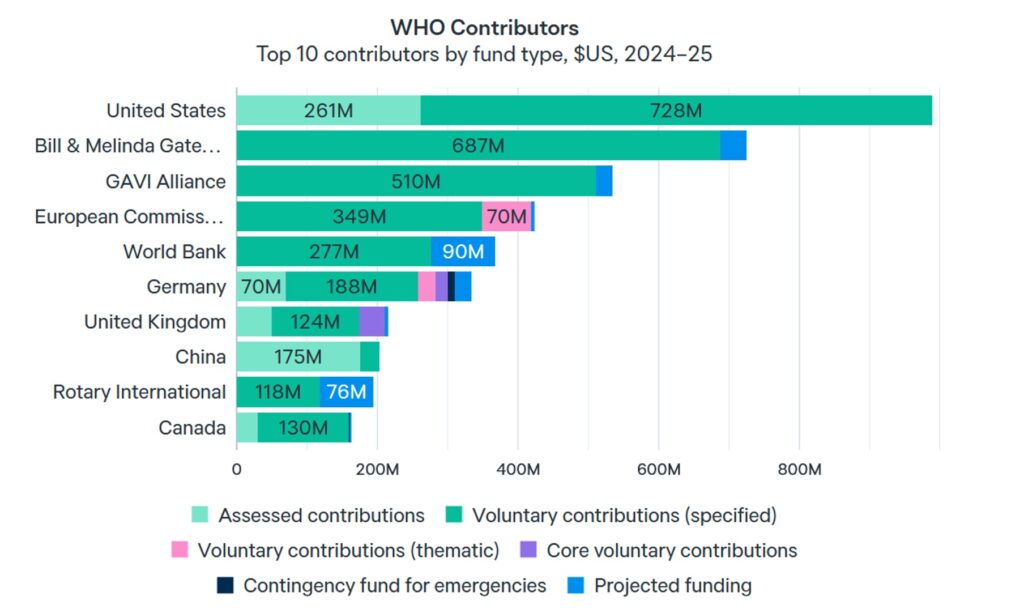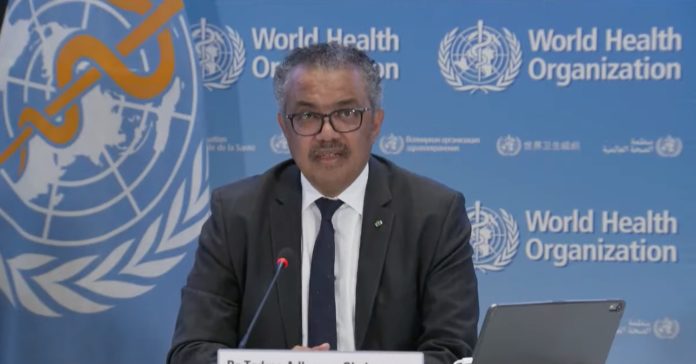By LINDA BOYLE
Within hours of being sworn in, President Trump issued an executive order directing the United States to withdraw from the World Health Organization (WHO).
In that executive order, Trump cites the WHO’s “mishandling of the COVID-19 pandemic that originated from Wuhan, China, and other global health crises, its failure to adopt urgently needed reforms, and its inability to demonstrate independence from the inappropriate political influence of WHO member states.” Trump faulted WHO for not holding China accountable for its slow response to WHO’s investigation of Covid-19 origins.
This withdrawal will undoubtably have an effect on the WHO’s finances. The US provides more money to the organization than any other member state. The US also provides funding above the assessed dues which is designated to be spent on specific issues.
At this time, about 70% of WHO’s budget is from voluntary contributions, making it difficult for the WHO to set its own public health priorities. In 2022, WHO member countries agreed to reform its financing model, aiming to make countries’ membership fees about half of its budget by 2030, AP reported.
Of the 2024-25 budget for WHO, “US funding comprises 22% of its assessed contributions ($261 million) and more than 14% of its voluntary contributions (nearly $728 million). That funds 20% of WHO’s emergency response work, and 25% of its core program.” Privately, WHO doesn’t know how to would make up the loss of US funding and would be faced with a “hand-to-mouth type situation” in early 2026.
The graph below highlights the disparity in funding.

The world order is concerned by our withdrawal as our absence (and money) would likely exacerbate global health inequities. And therefore hinder “progress” towards global health equity. Tedros Adhanom Ghebreyesus, the Director-General of WHO, regrets America’s decision. His concern is equity and seeing health as a basic human right.
As pointed out in an MRAK article entitled, “Trump Administration rejects WHO pandemic rules, citing sovereignty concerns,” such thought process “would ultimately lead to the United States and wealthier nations being responsible for the health of 8.2 billion people, regardless of their location, lifestyle choices, or medical history.”
As part of the IHR recommendations, on May 20, the 78th World Health Assembly (decision making body of WHO) agreed to a Pandemic Agreement. The adoption occurred with a vote of 124 in favor, 0 objections, and 11 abstentions.
The amended IHR would give the WHO the ability to evaluate and do risk assessments of future possible public health emergencies and order global lockdowns, travel restrictions, or any other measures it sees fit to respond to that emergency. While the WHO specifically states it cannot interfere with the sovereignty of a nation, that would seem to contradict the IHR Pandemic Agreement wording. The WHO would become the “central coordinating authority”.
Prior to the passage of the 2024 International Health Recommendations amendments by WHO, US Health and Human Services Secretary Robert F. Kennedy, Jr. and Secretary of State Marco Rubio provided a joint statement stating that the US rejects those amendments.
In discussing why the IHR amendments were rejected, Secretary Kennedy said he was concerned about provisions for a global health ID system and vaccine passports. Kennedy stated this would lay the groundwork for “surveillance of every person on the planet”.
Secretary Kennedy also said, “the agreement is an official treaty that bypasses the US Senate” and the senate “plays a key role in assuring international commitments receive democratic oversight.”
The proposed amendments to the International Health Regulations open the door to the kind of narrative management, propaganda, and censorship that we saw during the COVID pandemic, Kennedy said.
Secretary Kennedy also released a video explaining the action to the American people. He went on to state, “The United States can cooperate with other nations without jeopardizing our civil liberties, without undermining our Constitution, and without ceding away America’s treasured sovereignty.”
In the joint statement with Kennedy, Secretary of State Marco Rubio said “this administration will never cede control over American public health decisions to unelected international bureaucrats. We will always defend the rights of the American people to self-determination.”
Shortly after the EO was announced, a group of Democrat Congressmen and women asked President Trump to reconsider pulling out of the WHO. Shortly after that, Trump stated he was possibly open to negotiating with the WHO if they would clean up their act.
Lawrence Gostin, professor and chair of global health law at Georgetown University and director of the O’Neill Institute, stated Trump’s decision to withdraw from the WHO may leave him open to legal actions. Goslin wrote on X that because it was an act of Congress that we joined WHO in 1948, Trump would need congressional approval to withdraw. Goslin is contemplating a lawsuit against this action.
If you read the specifics of the resolution, you will note it states “In adopting this joint resolution, the Congress does so with the understanding that, in the absence of any provision in the World Health Organization Constitution for withdrawal from the Organization, the United States reserves its right to withdraw from the Organization on a one-year notice: Provided, however, That the financial obligations of the United States to the Organization shall be met in full for the Organization’s current fiscal year. (62 Stat. 441, 442 (1948).)”
It doesn’t state that withdrawal notice has to be by Congress. President Ronald Reagan withdrew from UNESCO without Congressional approval and then President George W. Bush rejoined.
I am sure there will be more to follow.
There is always more to the story when money and power are involved.
Get your popcorn and stay tune for episode two.
Linda Boyle, RN, MSN, DM, was formerly the chief nurse for the 3rd Medical Group, JBER, and was the interim director of the Alaska VA. Most recently, she served as Director for Central Alabama VA Healthcare System. She is the director of the Alaska Covid Alliance/Alaskans 4 Personal Freedom.
